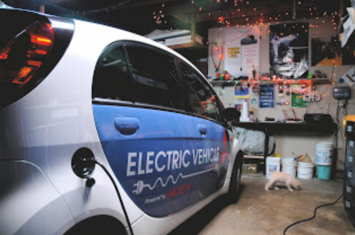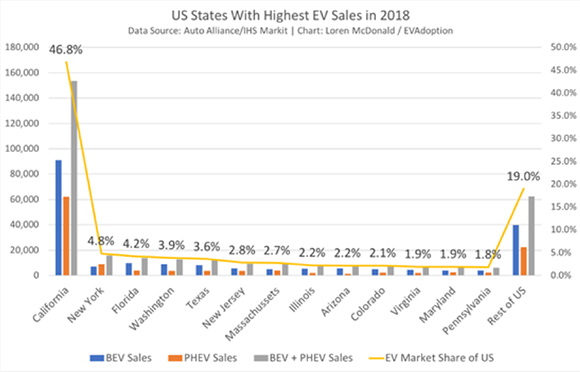
We’re constantly being bombarded with the EV movement, but Americans must have a multitude of subconscious reasons for not buying into one of the major movements to save the world from itself as they are showing their lack of enthusiasm by avoiding the dealerships.
In a recent Los Angeles Times article, citing Edmunds data, The number of battery-electric models available more than doubled from 2018 to 2019, but EV sales budged in the wrong direction. In response to the major efforts by manufacturers, the horrific EV sales data shows that only 325,000 electric and plug-in hybrid vehicles were sold in the U.S. in 2019, down from 349,000 in 2018.
Those dismal numbers represent an embarrassing dismal 2% of the 17 million vehicles of all types sold in the United States in 2019. Are EV carmakers driving off a cliff?”
California remains the primary buyer of EV’s while the rest of America has shown little interest in the incentives and the increasing choices of models.
Let’s look at several of the factors that may be contributing to this lack of enthusiasm, that may be in the subconscious of the prospective EV buyers:
Agreed, there would be no fuel costs and no gas taxes to be paid with an EV owner, BUT, and that’s a big BUT. Beware of the “free” gift! Once fossil fuel cars are off the road, the only ones on the roads will be EV’s. You can easily surmise that it’s going to be the EV owners picking up the costs to maintain the highway infrastructures, probably through some form of vehicle mileage tax (VMT), to let the “users” pay for the roads.
EV’s are hyped as being pollution free. Well, not necessarily so. Its true EV’s have no tailpipes, but the tailpipes are located at the power plants generating the electricity to charge the cars batteries, and at the refineries that provide all the derivatives from petroleum that make all the parts of the EV’s.
Range and charging anxieties remain a constant sub thought for that next trip. To fully charge an EV, even at fast-charging stations, it takes anywhere from 30 minutes to 8 hours depending on how much of a charge (empty to full or topping off) your vehicle needs.
Hybrid and electric car owners are a scholarly bunch; over 70 percent of respondents have a four-year college or post-graduate degree, which may explain that the average household income of electric vehicle (EV) purchasers is upwards of $200,000. If you’re not in that higher educated echelon and the high-income range of society, there may not be an appetite for an EV.
The lack of mining standards and environmental regulations to extract the exotic metals used in EV batteries exposes local ecosystems to destruction when the wastewater and other unusable ores are let loose onto the environments. The workers have no choice but to live in horrific conditions because their wages are so infinitesimally small, it causes me the take a step back and examine my moral obligations to humanity. Green technology cannot thrive off human rights abuses.
There are numerous documentaries about the atrocities the workers are put through in the cobalt mines, i.e. actually digging the mines by hand along with the horrendous living conditions. Amnesty International has documented children and adults mining cobalt in narrow man-made tunnels along with the exposure to the dangerous gases emitted during the procurement of these rare minerals.
Governments and manufacturers are “blowing off” the transparency of the child labor atrocities and mining irregularities of where and how those exotic metals are being mined in Africa, China, Argentina, Bolivia and Chile to support the EV battery supply chain. The first transparency law was in California, the largest buyer of EV’s in the country, starting with The California Transparency in Supply Chains Act SB657 and followed by the U.S. with H.R.4842 – Business Supply Chain Transparency on Trafficking and Slavery Act of 2014.
The richest most powerful companies in the world, and now the Governor of California are still making excuses for not investigating the supply chains and continue to power manufactured EV’s with “dirty batteries”. Can this be a blatant example of hypocrisy?
With Tesla batteries weighing about 1,000 pounds, slightly more than the C-batteries in your flashlights, proper disposal of the EV batteries will be needed to be addressed in infinite detail by somebody. Another area of concern that keeps coming up in consumer surveys regards an electric car’s battery life. To be sure, replacing an electric vehicle’s battery will be an expensive proposition along with the environmental challenges to dispose of them safely.
Despite the fears, concerns, and environmental questions being evaluated by the public and the potential EV buyers, governments are wishing to counteract the slower than expected transition to EV’s. Governments are starting to make giant steps to accelerate the move away from petroleum vehicles.
Britain announced that they will ban new petrol and hybrid cars from 2035. France is preparing to ban the sale of fossil fuel-powered cars by 2040. The mayors of Paris, Madrid, Mexico City and Athens have said they plan to ban diesel vehicles from city centers by 2025. The ban on fossil fueled vehicles is gaining momentum internationally!
Government involvement in our daily lives recalls the most terrifying nine words in the English language:” I’M FROM THE GOVERNMENT AND I’M HERE TO HELP.”
This piece previously appeared on CFACT.org.
Ron Stein is an engineer who, drawing upon 25 years of project management and business development experience, launched PTS Advance in 1995. He is an author, engineer, and energy expert who writes frequently on issues of energy and economics.













